With AFI and USC dominating this year’s seven finalist slots, this year’s batch of Student Academy Award nominees continue to highlight a diverse, colorful blending of genres from filmmakers of all walks of life. Whether feminist dystopian sci-fi or electrically choreographed musicals, there’s something here for everyone, and it shows in the backgrounds of each of these talented directors. In this interview series, Film Section Editor Sergio Zaciu sat down with all seven finalists of 2019’s Narrative – Domestic section, hoping to learn more about their personal backstories, what brought them to the director’s chair, how they made their respective films, and what exciting prospects await them next in their careers.
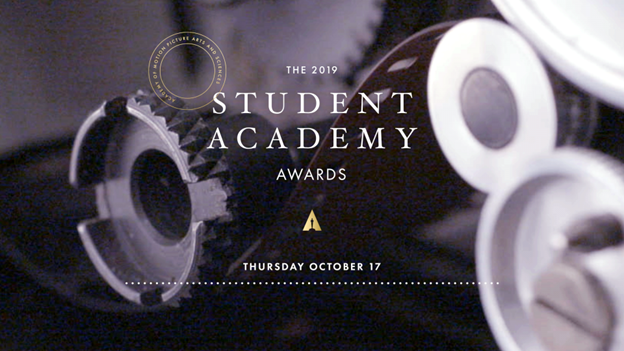
AFI hit the Student Academy Awards like a wrecking ball this year, racking up five out of the seven finalist slots in the Narrative – Domestic section. Among them is Omer Ben Shachar’s TREE #3, an adorable immigrant tale of a boy growing to love his own cultural identity in a world that often pushes against it. Effortlessly performed by a dynamic ensemble of child stars, Shachar’s film builds to a breathtaking (and tearjerking) finale that perfectly encapsulates the magic of being a dreamer, and never giving up on your passion. Doubling down on this already powerful coming-of-age tale is TREE #3’s context within the current zeitgeist. As a film about a boy learning to love himself, it’s great. But as a film reminding us why we should be here to support unheard voices in the arts, it’s magical.
Do you come from a musical theatre background?
I did! It’s nice you noticed that from the short. I was doing a lot of musical theatre as a kid and was obsessed with Broadway.
I could definitely feel that in the movie.
Yeah. As an Israeli kid I always dreamt about becoming an actor. And in Israel I had a little success (for an eight-year-old, of course), but once I moved to Texas I couldn’t get any roles because of my accent. And I was really ashamed of it at the time. So that’s where TREE #3 really comes from.
So it’s a very personal story.
Yes, very much so.
Was there a bit of a culture shock in your move from Israel to Texas?
For sure, if only because of how different Israel and Texas are. But I eventually found my place. I became part of the Houston ballet which was a great experience, and I got involved in theatre as well. It was a big chunk of my life so obviously things changed with time, but I distinctly remember the first week because I didn’t know any English. I was really afraid. I didn’t know how I would survive. I had these three post-it notes: “Where is the restroom?” “Can you call my mom?” and something else, and that’s how I would communicate. I just knew “yes,” “no,” “cat,” and “dog.” I was part of an international classroom so everyone in that class had English as a second language. But, the thing that’s really personal isn’t really how tough the experience was, but rather how hard I tried to still do my art in spite of the challenges. I put on my own plays in my living room at home! I had a CATS DVD and learned all the dance moves and used my parents’ clothes to make the costumes. And so I’d invite my parents and my grandmother to watch. And so the grandmother character in the movie is very real to my life, because I never wanted to disappoint her with my shows. My grandmother is an Israeli poet and was always my art mentor along the way.
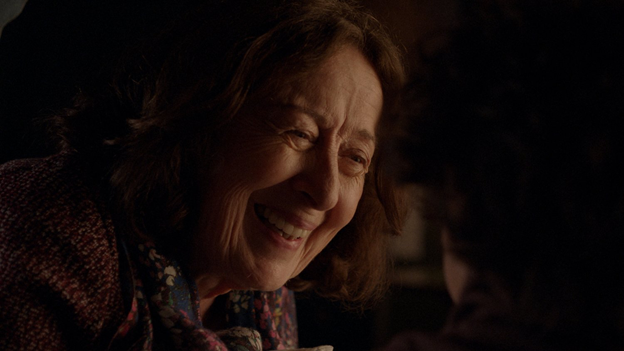
So when did you transition into film?
After a few years in Texas I moved back to Israel. I wanted to join the drama department at this art school but there was no room, so they put me in the film department. It did not appeal to me at first. But my first assignment really changed my opinion! My instructor asked us to make a list of things that bother us and make a film about that, and so I made a film about how I lost my luggage at the airport. It was called THE THINGS YOU CAN’T REPLACE. It wasn’t a great movie, but once it was done, I felt like I finally had something that nobody could take from me. So that idea of something existing permanently really appealed to me. So yeah, all my movies discuss certain insecurities I deal with, putting my concerns on the screen.
When it came to writing the movie, how early on did you know you wanted to make a film about your life experience wanting to be an actor?
It took a while. At first we had this totally different sci-fi idea, but as we were developing it, we kept coming back to these movies we liked, movies about dreamers: RATATOUILLE and LITTLE MISS SUNSHINE. They’re all films about people who are told they can’t do something because of what they are. And so I had a lot of passion about this concept.
And were those other film ideas also kid-friendly concepts or were they totally different?
They were not, and to be honest, I don’t even view TREE #3 as a kid-friendly movie. Sure, the lead is a kid, but the way I saw them was films that had similar arcs. All of them were about characters who are different from the status quo and who don’t like themselves at first, only to learn their value and worth by the end. So the themes were always about identity and loving yourself.
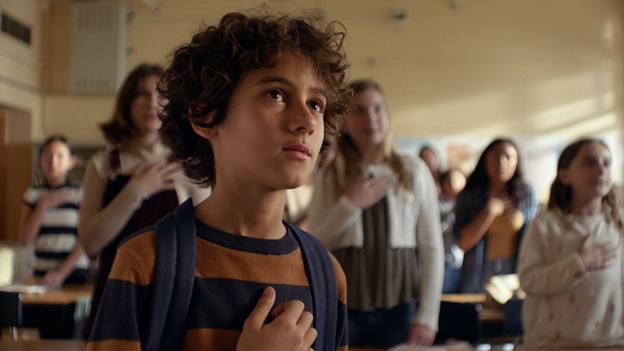
How long did it take to write that third act? I feel like that’s the moment that definitely takes the viewer’s breath away.
We figured it out a week before we shot! We had everything planned, but the ending was more chaotic. We thought the film would end with the audience not liking the show but the parents clapping anyway. And we thought it was okay, but it wasn’t really quite there. And so we got notes on the ending and literally the week before shooting we sat down with our mentor, Michael Urban, and discussed it. We were a little worried because we didn’t have enough extras to really have the ending work, and suddenly Michael suggested this idea of the audience pulling their phones out and supporting the protagonist. Every time I think about it I just go “Wow, the magic of moviemaking!” The best part of the film is the ending, and we figured it out a week before shooting! We couldn’t even shot-list it properly. We didn’t have a ton of extras, either, so we just had to start thinking creatively. I guess that’s where reality just catches up with you and you have to start realizing what you can or cannot do. And I mean, Michael was our mentor for 12 weeks and even he didn’t have this idea until the very end, so who knows… if we would’ve gone with another idea maybe we wouldn’t have a Student Academy Award now!
Can you talk a bit about the grandmother scene?
Yes, of course! We got so many notes on this scene. People didn’t find it realistic. Why would his beloved grandmother give him notes on his acting when he’s feeling so down? Even my mom thought it was a little harsh and didn’t like the scene. So why didn’t I remove that scene after all these people said they didn’t like it? I don’t know. I was very insecure about it, but I guess I just trusted my gut on that one. I think it ultimately works because the grandmother has a lot of heart, and at the AFI preview screening, everyone said that was their favorite scene; because there’s just a real, genuine connection. So yeah, I guess my advice to filmmakers would be to listen to your gut.
That’s interesting, though, because we tell ourselves to listen to our gut, but then also a mentor can come in last minute with a totally new approach to the film’s ending and change everything!
Exactly! Listen to your gut but also be open at the time. I guess my gut also told me that the old ending didn’t work, and once Michael had that idea I went “hmm, that’s cool!”. Also the fact that the previous version was too complicated to shoot was definitely the film screaming at us and saying “change the ending!”
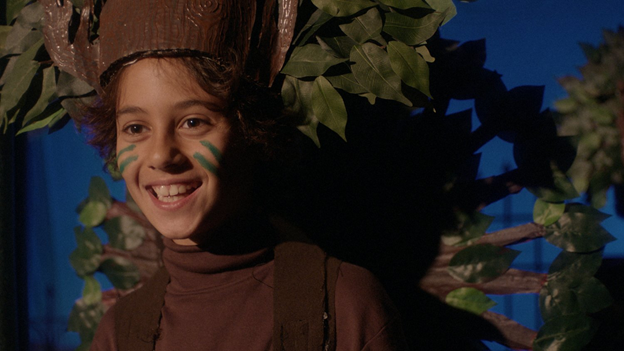
How did you find your lead actor? He’s so amazing.
He’s amazing! And the crazy thing is he had never acted in anything before. His mom knew my casting director and since we were looking for such a specific type of person (an Israeli boy with an accent), it was a perfect fit. He just has so much energy and spark, but in real life he’s such a shy boy.
Did you have to get him out of his shell?
No. He just did it all himself as soon as you put the camera in the room. If you give him a game to play, or an objective like “impress the teacher” he just goes for it. I think he was just really excited because he had never gotten to act before.
What about casting the teacher?
It wasn’t really a hard casting process. I liked the audition and so we cast her. It was nice that she had a slight Texas accent, so it kind of helped set our world there without being too upfront about it. We knew she would be the villain, but we tried as hard as we could not to make her a total villain. So that was definitely a challenge.
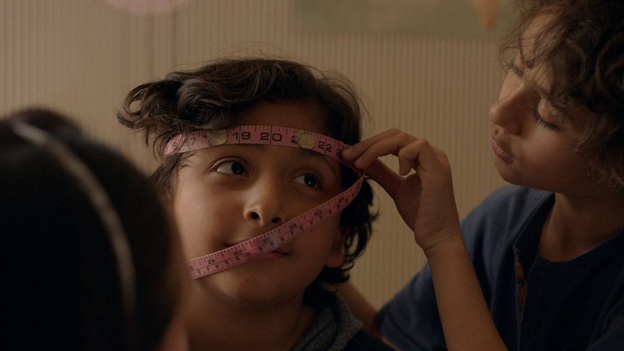
You already mentioned RATATOUILLE and LITTLE MISS SUNSHINE. Did you have any other clear visual references you used for the film?
Yeah. We wanted the film to feel nostalgic. We didn’t want to set the film in the past, but we wanted to make the film feel a little vintage so the audience would be reminded of their own childhoods. One reference was LADY BIRD, another was WHERE THE WILD THINGS ARE. We really loved those pastel color palettes. We also did very specific things like DIARY OF A WIMPY KID, which has a scene with background trees in a school play. Oh, and 500 DAYS OF SUMMER, because it has a similar texture.
Are you working on any feature or other projects right now?
Yes, I’m working on a comedy based on my experience in the Israeli army.
So it’s a very different project?
Not really. It’s different in the setting, but it’s a very similar emotional arc. Both films are about learning to value yourself. I’m also developing an animated show based on my grandmother’s book. It’s about a teenage witch and her talking cat, so that’s exciting. And I also want to direct another short called RE-SELF. My directing teacher once said that making films is a muscle so you just have to keep working it.
You also just got accepted to the Viacom directing program, so first of all, congratulations. What’s that about?
Thank you! It’s a shadowing program with Nickelodeon TV shows. It’s a great opportunity that I’m really excited about.
Awesome! Well thank you for talking to me!
For sure! Thank you!
Catch TREE #3 at the festival circuit and keep your eyes peeled for more of Omer’s work in the future!



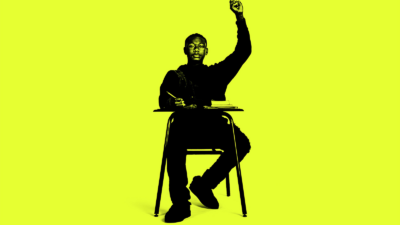

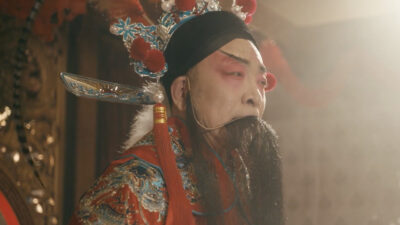
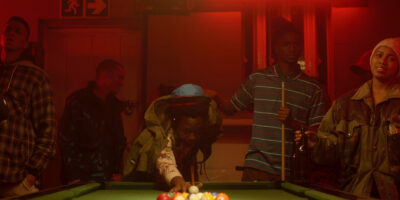
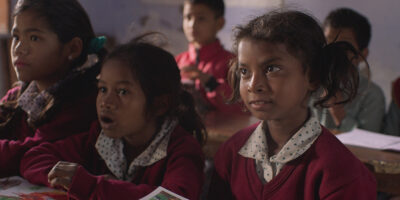
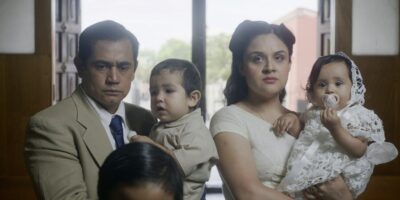
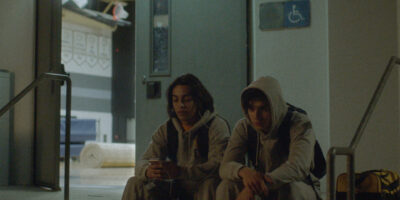
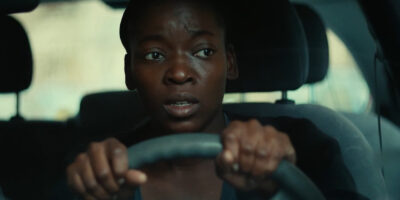





Comments